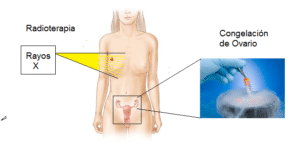When talking about fertility, most women know the most common diseases of the female reproductive system that can make it difficult to get pregnant, the most common being diseases in the uterus or ovaries. What many do not know is that diseases and ailments also occur in the fallopian tubes that can put their health and their ability to become mothers at risk in the near future.
Obstruction of the fallopian tubes is one of them. This obstruction usually occurs due to infectious processes in which multiple microorganisms can colonize and infect the female genital tract and damage the fallopian tubes. Another way of producing this alteration in the fallopian tubes occurs when inflammatory processes of nearby organs such as the urinary or digestive tract, such as when suffering from appendicitis.
To know the current state of the fallopian tubes, an examination can be performed to know the patency of the fallopian tubes. The most common is an X-ray called hysterosalpingogram , in which a catheter is passed through the cervix, and by means of contrast, to know if they are permeable or not. There is also the hysterosonography, an ultrasound where water or air is passed through the tubes to check their proper patency
When a woman has an obstruction in the fallopian tubes, it is not usually accompanied by any symptoms or abnormalities that indicate that she may be having problems in this part of her body. But, when the treating doctor suspects a fertility problem, he or she can order these check-ups and thus directly diagnose the problem and its most effective treatment.
Treatments for tubal blockage
Currently, there are treatments to correct the blockage of the fallopian tubes. If the patient is young (under 30 years old) it is possible to do surgery where the gynecologist enters the pelvic cavity to observe if there are adhesions that are obstructing the tubes, release them and, by means of a contrast medium, observe whether or not this intervention achieves the unblocking of the tubes. For older patients, In vitro fertilization is recommended, because with this treatment, the participation of the tubes is obviated when achieving fertilization of the egg in the laboratory.
When a woman suspects that she may have a fertility problem, a specialist doctor will seek to know the state and function of her fallopian tubes in order to seek the appropriate treatment to achieve a pregnancy in a healthy and safe way. Visit our InSer headquarters in Bogotá, Medellín, Rionegro, Pereira and soon Cartagena to check your health status and thus achieve your dream of being a mother.
InSer Group.

